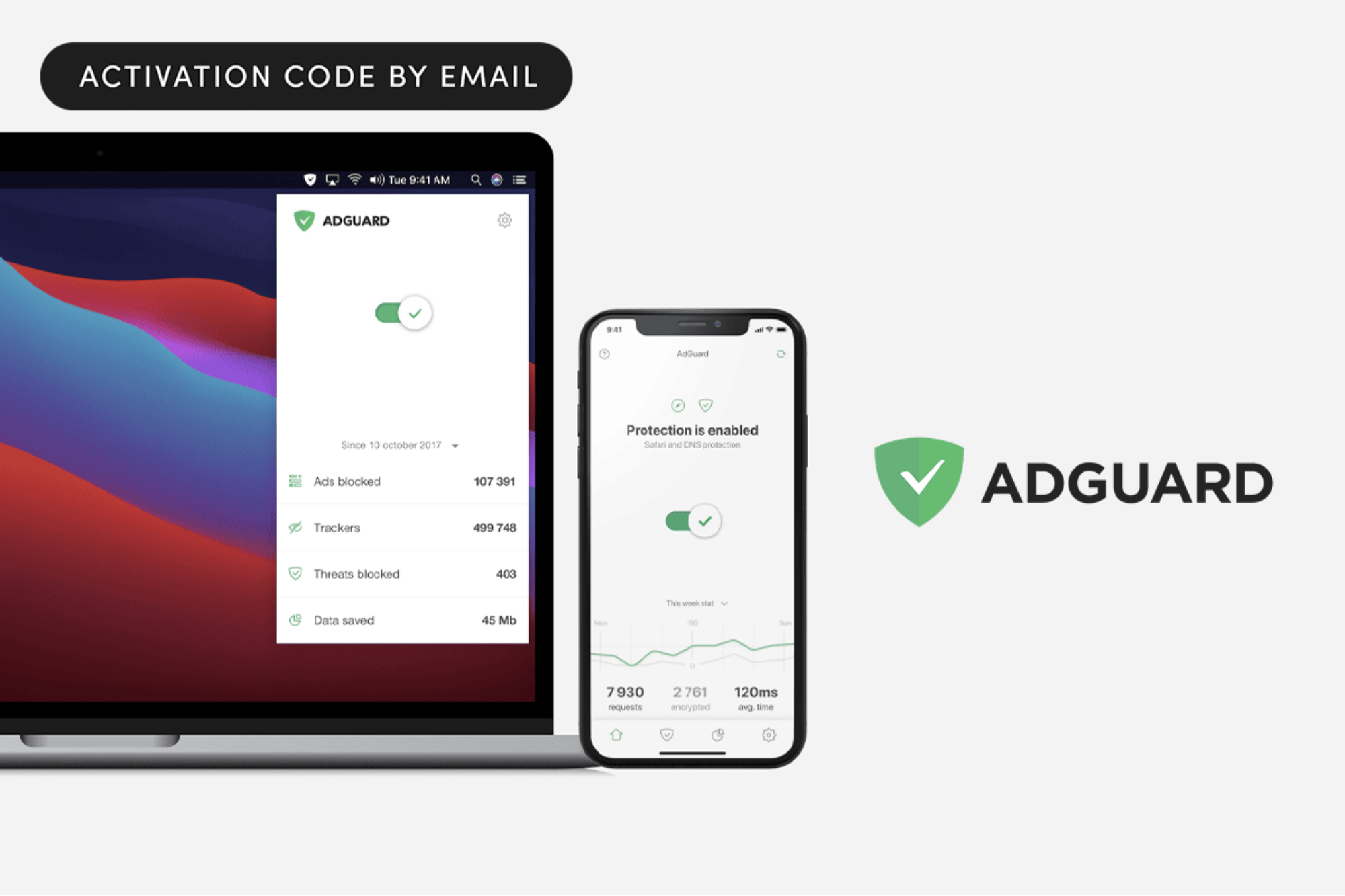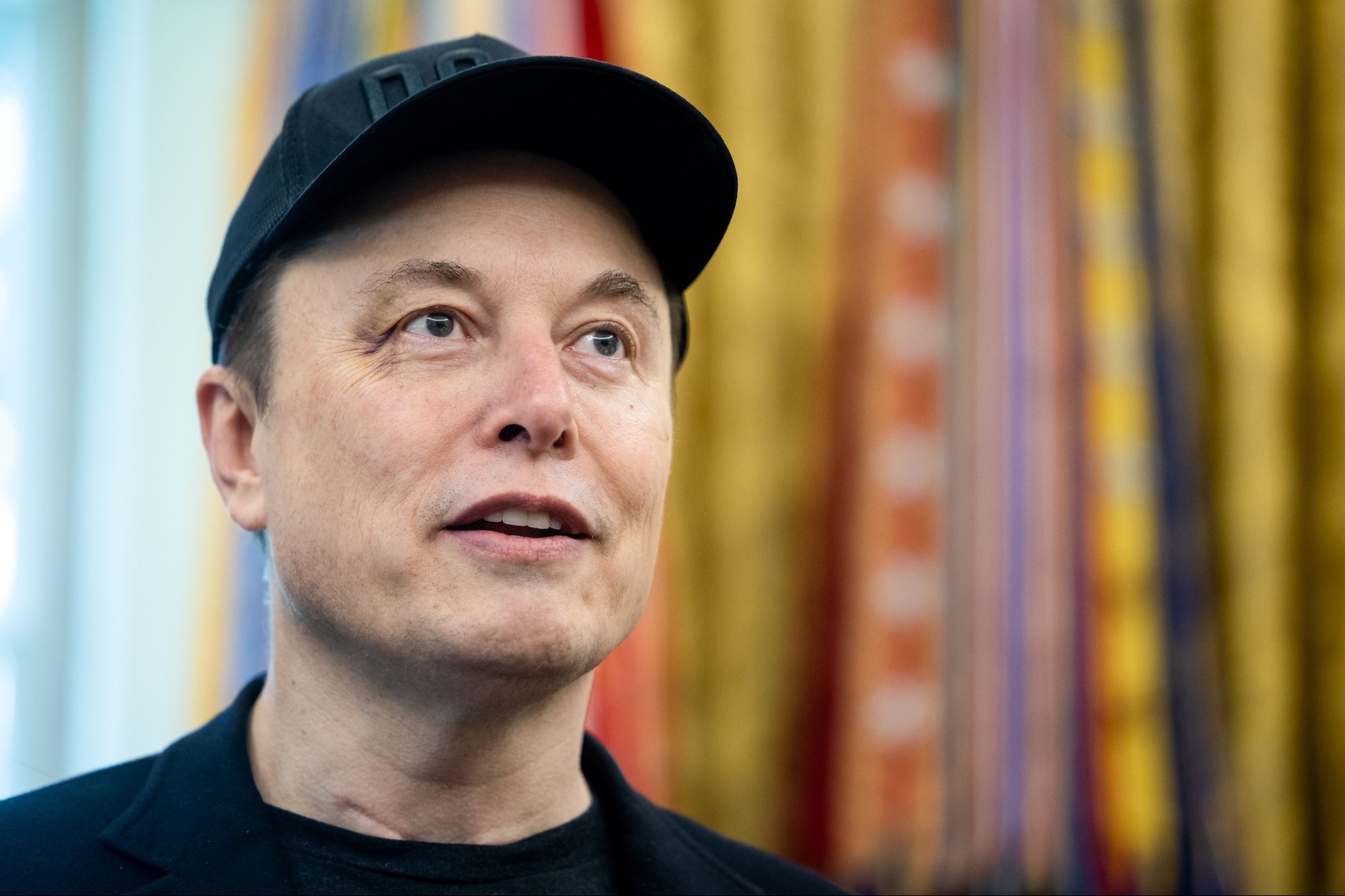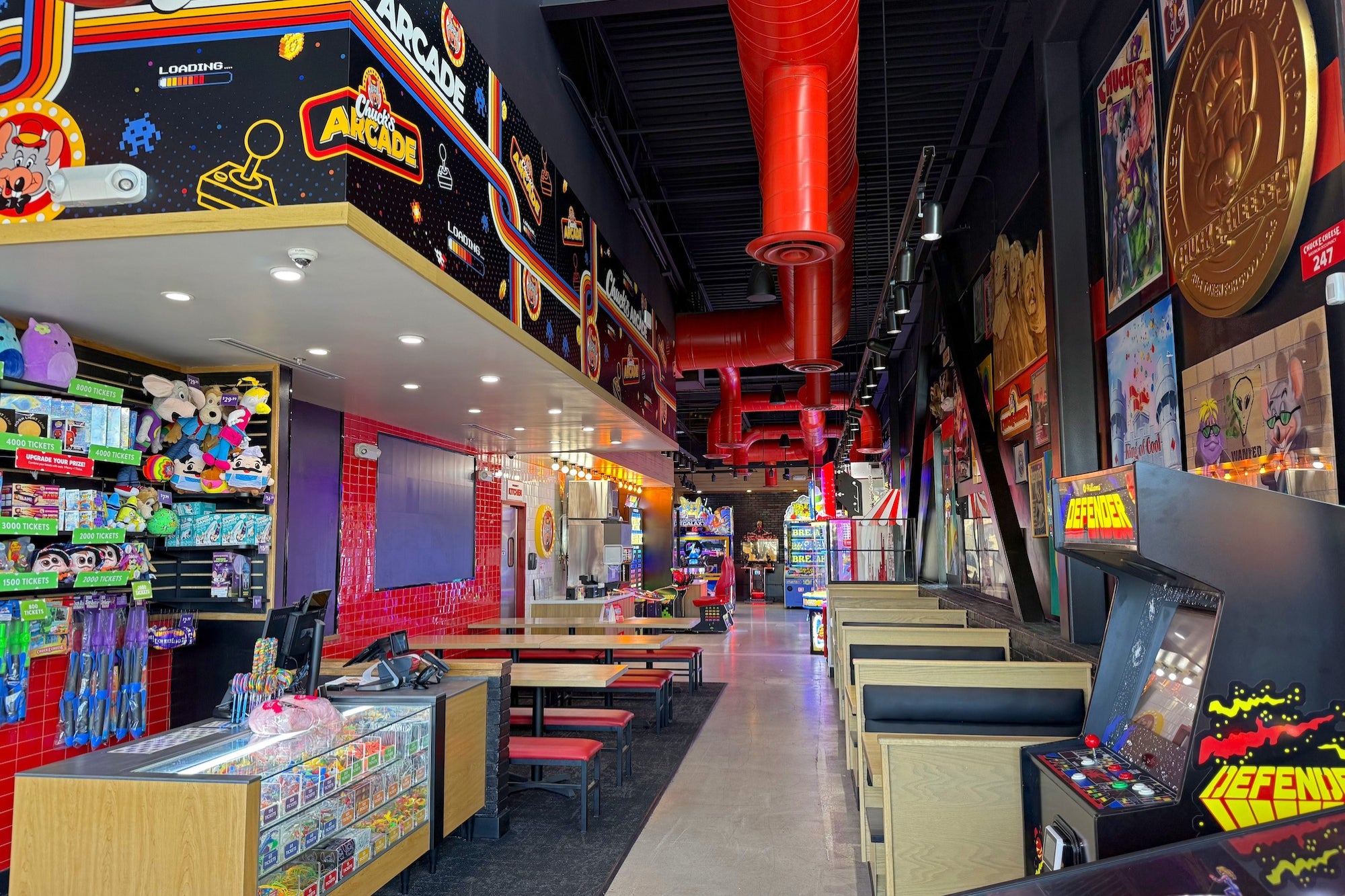This Side Hustle Spotlight Q&A features Jason Rosenbaum and Hailey Swartz, co-founders, with Alex Swartz, of veggie burger brand Actual Veggies. Responses have been edited for length and clarity.
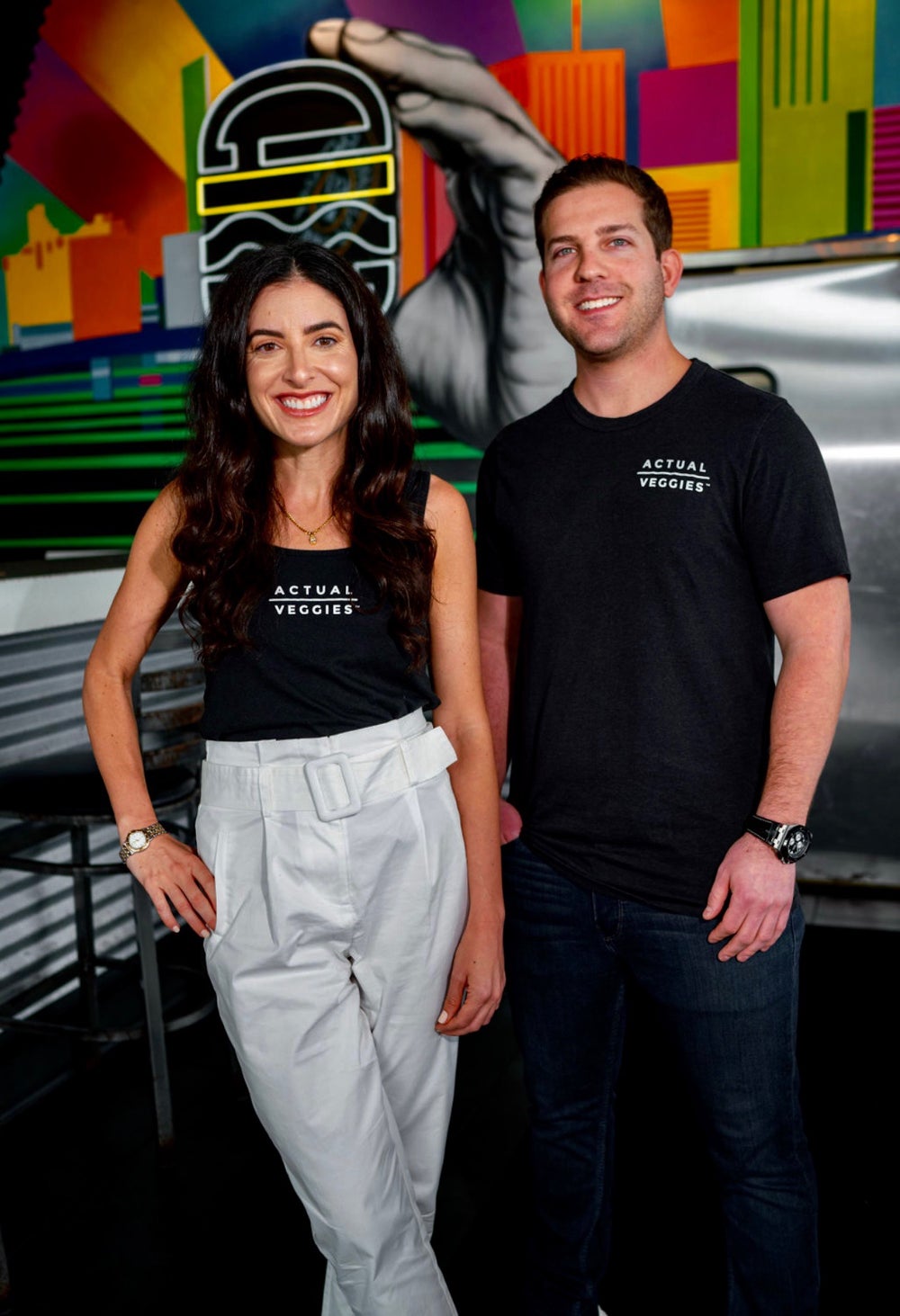
Image Credit: Courtesy of Actual Veggies. Hailey Swartz and Jason Rosenbaum.
Want to read more stories like this? Subscribe to Money Makers, our free newsletter packed with creative side hustle ideas and successful strategies. Sign up here.
What was your day job or primary occupation when you started your side hustle?
Rosenbaum: I was working at a mattress company by day and flipping veggie burgers by night. I’d wake up at 5 a.m. to focus on Actual Veggies before clocking in, squeeze in calls during lunch breaks and stay up late tasting recipes and building our pitch deck. Nights and weekends were all about laying the foundation — testing concepts, researching packaging and learning everything I could about a brand-new industry. As things started getting more real, it naturally evolved into a side hustle, and then eventually, my full-time job.
Related: Tired of ‘Culturally Obtuse’ Products, This 27-Year-Old Took His Side Hustle From $1,000 a Month to 7-Figure Revenue: ‘Pick the Right Opportunity to Pursue’
Swartz: I was working in product strategy for Alibaba. I was one of the initial employees who helped start the North American arm for Alibaba B2B. Our job was to work with our counterparts in China to build products and services to make it easier for companies to source from suppliers in China and also enable North American suppliers to sell on Alibaba.com. Every day, I was talking to entrepreneurs and SMBs to understand their unique problems and help them grow and create efficiencies within their business. I was inspired by the fun that these entrepreneurs had and had the itch to start my own company.
When did you start your side hustle, and where did you find the inspiration for it?
Rosenbaum: The idea for Actual Veggies started brewing in early 2020. I had stopped eating meat and was searching for a clean, restaurant-quality veggie burger that actually tasted like vegetables, not some ultra-processed meat alternative. One night, I literally woke up from a dream with the name “Actual Veggies” in my head. I immediately searched for the domain on GoDaddy, and it was available. I bought it on the spot and ran with the name.
A few weeks later, I teamed up with Hailey; we were connected through some college friends — she went to the University of Michigan, and I grew up in Michigan. In March, we learned about Big Idea Ventures at a healthy food expo and applied to join its next cohort. We got accepted into an accelerator later that year and raised our first round of funding — even though we were still just a concept (our first product samples arrived at our investors looking like soup). But they believed in us and our vision. We officially launched via QVC in early 2021, and by July, we were on shelves at Sprouts nationwide.
Swartz: In February 2020, Jason shared the idea for Actual Veggies and asked me if I would like to be part of it. While I eat meat, I love a good veggie burger and have a visceral reaction to products that are trying to taste like meat. The idea of making a delicious veggie-forward burger with whole, real ingredients to sell to grocery stores sounded way too obvious to me. How could this not exist already? Quickly, I realized it didn’t, and it was an enthusiastic yes from me. There was only one condition: My brother Alex would also join us as a co-founder. Jason agreed, and the three of us quickly got things going.
Related: ‘You Can Go Viral Overnight’: This College Student and His Brother Spent $5,000 to Start a Side Hustle — Now Their Brand’s Making Over $175 Million
What were some of the first steps you took to get your side hustle off the ground? How much money did it take to launch?
Rosenbaum: One of the first things we did was start talking to chefs — we had the vision but needed help turning it into an actual product. Eventually, we partnered with a chef who believed in what we were building and agreed to take equity instead of cash. At the same time, we were reaching out to manufacturers and quickly realized it wasn’t going to be as simple as making a few patties in a kitchen and scaling up. The process was complex, expensive and filled with unknowns — but we didn’t lose our drive.
Hailey and her brother Alex had agreed to match me and invest up to $10,000 each to get this off the ground. Before we even spent that, we were accepted into the Big Idea Ventures accelerator, which gave us $125,000 in cash and a ton of resources. That gave us just what we needed to launch — but more importantly, it gave us validation, structure and serious motivation.
Swartz: I’ve heard the question: How much of your success is due to luck versus working hard? I do think we’ve had both. However, a very key moment of luck that helped us get the company off the ground was going to a healthy foods expo in New York City on March 7, 2020 — two days before the world shut down. While one of us, of course, left the trade show with Covid (part of my luck was that it was not me), we also met a company exhibiting at the show that was part of Big Idea Ventures (a plant-based accelerator) and suggested we apply for the next cohort. We applied to that accelerator and eventually got in. The money and resources were definitely key in getting Actual Veggies off the ground, but for me, the external validation of our concept gave me the extra force of confidence I needed to fully lean in.
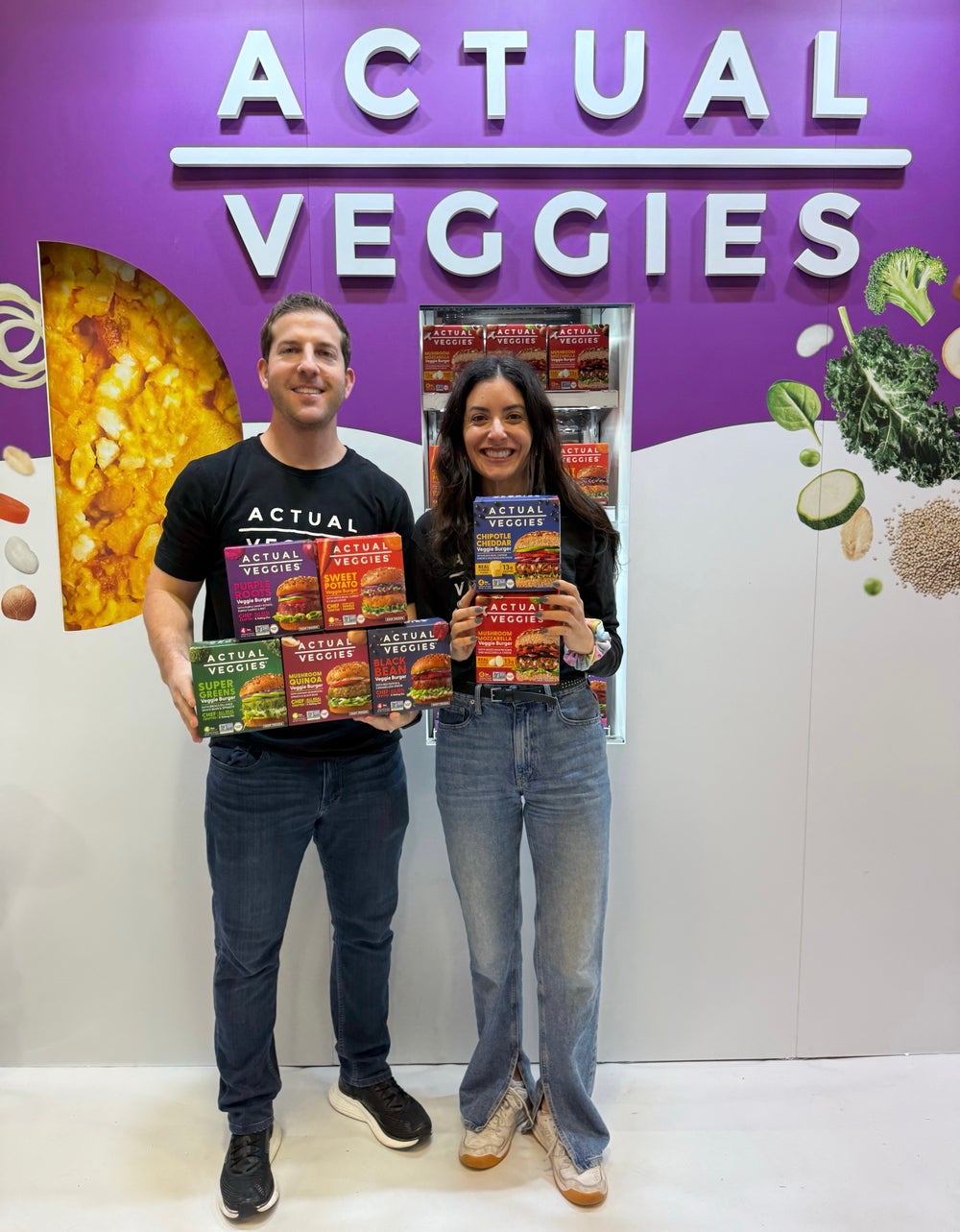
Image Credit: Courtesy of Actual Veggies
If you could go back in your business journey and change one process or approach, what would it be, and how do you wish you’d done it differently?
Rosenbaum: There’s something beautiful about being a founder in a completely new industry, because when you don’t know what to expect, you’re not afraid to figure it out as you go. You’re scrappy, you experiment, and you don’t overthink it. That mindset helped us get Actual Veggies off the ground.
That said, when I do this again, I’d take calculated shortcuts. Some of that comes down to skills — I’ve personally hand-packed burgers, sealed them in trays and shipped thousands of UPS boxes with ice packs across the country. But more importantly, it comes down to connections and knowledge. Now I know who to call, where to manufacture, how to avoid common pitfalls and when retail category reviews happen — which is critical in this space. I’d also know which partners to launch with and how to time it all for maximum impact.
Swartz: I would be really careful about who you bring onto your team. Once we showed just a bit of traction, so many people reached out to get involved and share how they could help. I’d be more cautious with hiring and structuring agreements with consultants, advisors and employees — especially around equity and out-clauses. Don’t just use boilerplate contracts. Work with a lawyer to understand the long-term implications. And if something’s not working, don’t be afraid to walk away. Set expectations early and keep checking in to make sure they’re being met.
Related: Her Postpartum-Inspired Side Hustle Hit $30,000 Revenue in 2 Months — Now It’s Making About $500,000 a Year: ‘I Truly Love Everything About It’
When it comes to this specific business, what is something you’ve found particularly challenging and/or surprising that people who get into this type of work should be prepared for, but likely aren’t?
Rosenbaum: Launching a food brand is way more complicated than coming up with a kitchen recipe or big idea and landing on shelves at a major retailer. That’s the dream, but the reality is, the number of steps in between is honestly terrifying.
You’ve got R&D, shelf-life testing, co-manufacturer sourcing, packaging, certifications, logistics, distributors, retail timelines, margin math, fundraising — and that’s just the start. If most people knew how complex it really is, they’d probably run the other way.
Swartz: A few things: First, taste is everything — and price is a close second. No matter how clean or innovative your product is, if it doesn’t taste great and isn’t priced correctly, it won’t sell. Second, the more popular the category, the harder it is to break in and stay on shelves. And third, do not try to completely reinvent the wheel. There usually is a reason things are the way they are; slight innovation is better than doing everything completely differently.
Can you recall a specific instance when something went very wrong? How did you fix it?
Rosenbaum: We were gearing up to complete our first big order when, right before packing, our tray sealing machine completely broke down. Total disaster.
Instead of throwing in the towel, we got scrappy. We tracked down a list of every facility within a few states that had purchased the same machine and started cold-calling them one by one. Miraculously, one said yes. So we loaded up a truck with all our burgers and materials, drove everything over and got the job done just in time.
It definitely wasn’t cheap, and it was nowhere near the original plan, but we couldn’t afford to fail on our first major order. And we didn’t.
How long did it take you to see consistent monthly revenue? How much did the side hustle earn?
Rosenbaum: After launching with both Hungryroot and Sprouts in mid-2021, we hit three straight months of $300,000 in revenue, which felt huge at the time. But after that initial spike, things got inconsistent.
We still closed out 2021 with nearly $2 million in sales, but it wasn’t until Q2 of 2022 that we really found our rhythm. That’s when we broke into multiple retailers and started seeing steady monthly reorders.
Related: After a 12-Year-Old’s Side Hustle Made Over $4,000 in 1 Day, He and His Dad Grew the Business to Nearly $50,000 a Month: ‘It Takes Commitment’
What does growth and revenue look like now?
Rosenbaum: We’ve continued to double year over year and are currently on pace to hit over $20 million in revenue in 2025. It’s been steady, strong growth — and we’re just getting started.
We are currently available in every state with over 7,500 total retail and restaurant doors, including Whole Foods, Sprouts, Albertsons and Kroger, and available regionally at Costco. We serve most online retailers, including Hungryroot, Purple Carrot and even Butcherbox. Based on industry data, our Black Bean Burger is the No. 1 selling veggie burger.
We are fortunate enough to have raised over $12 million from seven VC funds and over 50 angel investors. Fun fact is that we raised all $12 million via Zoom, with no in-person pitches.
Swartz: Our first major order was from QVC. Another thing I never in a million years envisioned is that I would have a chance to be on live television promoting veggie burgers. This actually was a great opportunity to get the word out about our brand and also make sure people liked our product.
What do you enjoy most about running this business?
Rosenbaum: I love that we turned a personal mission into a real brand — one that actually resonates with people. Also, I get to work with my wife, Cassi (who was our first employee), our baby in the next room and a team of smart, passionate people who truly care about what we’re building. Hailey and her brother Alex have become like family, and the rest of the team is just as special. Building something real with people I genuinely enjoy working with is the most rewarding part.
And on top of that — I love food. Getting to taste test, experiment and stay on top of the latest and greatest trends is a dream.
Swartz: I love that no two days are the same. I’ve grown so much personally — from becoming more confident in my decisions to speaking in front of crowds and mentoring others. But most of all, I value the relationships. Entrepreneurship can be lonely, but it’s easy to connect with people who understand it. Working with my brother is incredibly meaningful, and the bond I’ve built with Jason, Cassi and our team feels like family.
Related: This Nashville Mom Started a Flexible Side Hustle on Facebook — Then Grew It From $1,000 to $275,000 a Month: ‘Like a Scavenger Hunt’
What is your best piece of specific, actionable business advice?
Rosenbaum: I’ve said this before, and I’ll add to it — when launching a business in the CPG food space, you need to be patient… but not too patient. To put some real numbers behind it: From idea to launch, it should take you somewhere between eight and 14 months. (Actual Veggies started as an idea in January 2020, and we launched — albeit in a small way — with Pop Up Grocer in October 2020).
If you’re moving faster than eight months, you might be skipping critical steps or launching with the wrong partner — unless you’ve done this before and already have strong industry relationships in place.
On the other hand, if it’s taking longer than 14 months and you’re still not close to launching, that’s a red flag. At that point, it’s important to pause and reassess. That kind of delay often signals misalignment on strategy, product development hurdles or resource inefficiencies.
It’s a delicate balance between moving fast and building right — but hitting that window is key to maintaining momentum and not burning through your capital too early.
Swartz: Don’t be married to your original idea. Identify the retailers that are essential for your success and talk to them before you launch. If a buyer tells you your concept won’t sell, listen. Be ready to pivot. Your product has to work not just in your head, but on their shelves.
Join top CEOs, founders and operators at the Level Up conference to unlock strategies for scaling your business, boosting revenue and building sustainable success.


